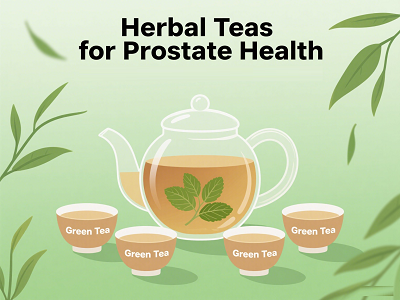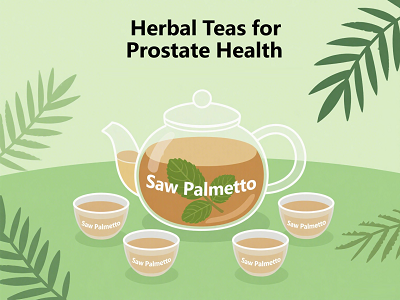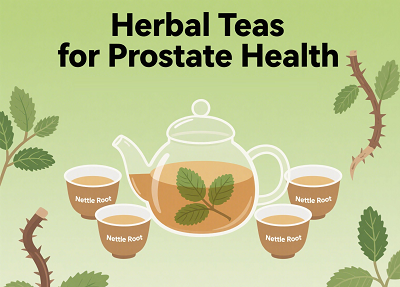Herbal Teas for Prostate Health: Natural Support for Men's Health
Prostate health becomes an important concern for men as they age. Conditions such as prostatitis, benign prostatic hyperplasia (BPH), and even prostate cancer can affect quality of life, leading to urinary problems, pelvic discomfort, and sexual health challenges. While conventional medicine offers effective treatment, many men are also turning to complementary options, such as herbal teas, to support long-term prostate wellness.
Herbal teas are not only soothing and hydrating, but also rich in bioactive compounds that may reduce inflammation, improve urinary flow, and protect prostate tissue. This article explores some of the most researched herbal teas for prostate health, how they work, and how to use them safely.
Why Herbal Teas for Prostate Health?
Herbs have been used in traditional medicine for centuries, and modern research is increasingly validating their potential. Drinking herbal tea offers several advantages:
- Anti-inflammatory effects – Inflammation is a key factor in prostatitis and BPH progression. Herbal compounds can help regulate inflammatory pathways.
- Antioxidant protection – Many herbs contain polyphenols and flavonoids that protect prostate cells from oxidative stress.
- Gentle daily support – Unlike pharmaceuticals, herbal teas can be consumed regularly as part of a preventive lifestyle.
Of course, they are not a replacement for medical treatment but can serve as a supportive therapy.

Best Herbal Teas for Prostate Health
Green Tea
Green tea is one of the most studied beverages in men’s health. It contains catechins—particularly epigallocatechin gallate (EGCG)—which have been shown to reduce prostate inflammation and inhibit cancer cell growth. Research published in the American Journal of Clinical Nutrition found that men who consumed green tea regularly had a reduced risk of prostate cancer progression [1].
How it helps:
- May slow the growth of prostate cancer cells
- Provides anti-inflammatory and antioxidant benefits
- Supports weight management, which is linked to better prostate outcomes
Saw Palmetto Tea
Saw palmetto is traditionally used for urinary and prostate health. Extracts from its berries are widely used in supplements, but the tea also contains beneficial fatty acids and phytosterols. Studies suggest saw palmetto can improve lower urinary tract symptoms associated with BPH, such as frequent urination and weak stream [2].
How it helps:
- Reduces urinary frequency and urgency
- May inhibit the enzyme 5-alpha-reductase, linked to prostate enlargement
- Can be combined with other supportive herbs for synergistic effects

Nettle Root Tea
Nettle root (different from nettle leaf) has been used in traditional medicine for urinary problems. While clinical research is more limited compared to green tea and saw palmetto, some evidence suggests nettle root may reduce urinary urgency and help relieve discomfort in men with enlarged prostate.
How it helps:
- Supports bladder emptying
- Provides mild anti-inflammatory benefits
- Works well in combination with other herbs

Chamomile Tea
Chamomile is well-known for its calming properties, but it also has mild anti-inflammatory effects that may benefit men with chronic prostatitis or pelvic pain syndrome. While evidence is less robust than for green tea or saw palmetto, chamomile tea can support relaxation and reduce stress, which are important factors in prostate health.
How it helps:
- Eases pelvic tension and discomfort
- Provides gentle anti-inflammatory action
- Supports sleep quality, which aids hormonal balance
How to Incorporate Herbal Teas into Daily Life
- Start gradually: Begin with 1–2 cups daily and observe your body’s response.
- Combine wisely: Some teas, like nettle root and saw palmetto, work better together.
- Be consistent: Long-term, regular use is more beneficial than occasional drinking.
- Check interactions: If you’re taking medications for BPH, hypertension, or other conditions, consult your doctor before adding herbal teas.
When Herbal Teas Are Not Enough
For men with moderate to severe symptoms of prostatitis or BPH, herbal teas alone may not provide adequate relief. In such cases, natural herbal formulas like the Diuretic and Anti-inflammatory Pill may offer more targeted results. This traditional Chinese medicine formula has been used clinically to reduce inflammation, improve urinary function, and restore prostate health naturally.
Frequently Asked Questions (FAQ)
1. Can I drink green tea if I have prostatitis?
Yes. Green tea has anti-inflammatory and antioxidant properties that may help ease symptoms. However, because it contains caffeine, men with bladder sensitivity should start with small amounts.
2. How long does it take for herbal teas to improve prostate symptoms?
Herbal teas usually work gradually. Most men notice improvements in urinary comfort and inflammation after several weeks of consistent use.
3. Are herbal teas safe to combine with prescription medications for BPH?
Generally, herbal teas are safe, but some (like saw palmetto) may interact with medications. Always consult your healthcare provider before combining treatments.
4. Which herbal tea is best for an enlarged prostate?
Saw palmetto and nettle root are the most commonly used for BPH. Green tea provides additional protective benefits for overall prostate health.
5. Can herbal teas prevent prostate cancer?
There is no guarantee that any tea can prevent cancer. However, research suggests green tea may lower prostate cancer risk due to its high antioxidant content.
Conclusion
Herbal teas are a safe, accessible, and effective way to support prostate wellness. From green tea’s antioxidant power to saw palmetto’s urinary relief, these natural remedies can help men maintain urinary function and protect long-term prostate health. However, they should be seen as complementary rather than primary therapy—especially for men with chronic or severe conditions.
References
[1] Jian, L., Xie, L. P., Lee, A. H., & Binns, C. W. (2004). Protective effect of green tea against prostate cancer: A case-control study in southeast China. Int J Cancer, 108(1), 130-135.
[2] Tacklind, J., MacDonald, R., Rutks, I., & Wilt, T. J. (2012). Serenoa repens for benign prostatic hyperplasia. Cochrane Database Syst Rev, (12), CD001423.



